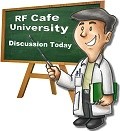|
<Previous
Next>
 The Space Race officially began on October 4,
1957, when the Union of Soviet Socialists Republic (USSR) successfully launched
Sputnik 1,
the world's first Earth-orbiting communications satellite. It was a big deal. The
"bird" transmitted a continuous alternate series of pulses at 20.005 MHz and 40.002 MHz,
with a 300 ms on and 300 ms off time. The batteries lasted through October
26. Sputnik 1 burned up in the atmosphere on January 4, 1958. The Space Race officially began on October 4,
1957, when the Union of Soviet Socialists Republic (USSR) successfully launched
Sputnik 1,
the world's first Earth-orbiting communications satellite. It was a big deal. The
"bird" transmitted a continuous alternate series of pulses at 20.005 MHz and 40.002 MHz,
with a 300 ms on and 300 ms off time. The batteries lasted through October
26. Sputnik 1 burned up in the atmosphere on January 4, 1958.
 Radio monitoring
stations all across the Earth scrambled to detect and track Sputnik 1's signals
while noting signal strength, frequency stability, time of detection, angle of arrival,
and other parameters that were used to assess flight trajectory and electronics
functions. Much of the data was voluntarily sent back to Russia from the U.S. and
other nations in the interest of advancing science. Amateur radio operators played
a huge role in the effort. Radio monitoring
stations all across the Earth scrambled to detect and track Sputnik 1's signals
while noting signal strength, frequency stability, time of detection, angle of arrival,
and other parameters that were used to assess flight trajectory and electronics
functions. Much of the data was voluntarily sent back to Russia from the U.S. and
other nations in the interest of advancing science. Amateur radio operators played
a huge role in the effort.
The front pages of newspapers everywhere splashed headlines announcing the launch
of Sputnik 1, similar to the one shown of the Erie Times News, the
newspaper of my adopted hometown of Erie, Pennsylvania. Back then, the Russian,
Chinese, North Korean, and other Communist nations were often referred to as "The
Reds" - not to be confused with the Cincinnati ball team. "Red Satellite Cuts U.S.
Prestige; Probe Sought," was the headline here. National intelligence and media
agencies were scrambling to learn as much as possible about the new phenomenon that
represented at the same time both a significant advance in technology and a potential
threat to security.
One of the lead stories, highlighted in yellow, announces, "Ham Radio Operators
on Alert in Erie Area." The story is a bit hard to read due to the low scan quality
of the paper; it is reproduced here:
"Ham radio operators in the Erie area were on alert last night for signals from
the Russian earth satellite, according to Stan Patterson, Erie Times-News amateur
radio columnist.'Erie hams should be able to pick up signals at any time from
the satellite,' Patterson said. "Specific frequencies can be picked up anywhere
in the satellite's orbit. They are transmitted as a regular beep every three-tenths
of a second.'
Patterson said the frequencies are 20.005 megacycles and 40.002 megacycles.
A few amateur radio operators in this area were reported to have established
contact with the Russian earth satellite last night but could not be reached for
comment."
An Internet search for more about the Ham reports from Erie did not turn up any
additional information. October 1957 was 59 years ago, so it is possible that Stan
Peterson has not yet become a Silent Key. If anyone reading this story knows Stan,
please let him know that we (I) would like to hear from him about the Sputnik monitoring
effort here in Erie.
Note that the Erie Times-News had a dedicated amateur radio column back
in the day. It had a
column for model airplane enthusiasts as well. "Hands-on" hobbies
where participants built and maintained most of their equipment had more of a "wow"
factor in the early days of technology explosion. The availability modern ready-to-use
gear has shifted focus more to operational proficiency than on the technical prowess.
Some old-timers lament the evolution, but I see it as a win-win scenario because
anyone who wants to can still design and/or build and/or restore vintage equipment
AND operate it, while others less technically inclined or simply not wanting
to spend the time can concentrate on useage skills. The level of operator proficiency
in all realms of hobbies has undeniably improved due to the option.
Posted December 16, 2016
|



























 "
" The Space Race officially began on October 4,
1957, when the Union of Soviet Socialists Republic (USSR) successfully launched
The Space Race officially began on October 4,
1957, when the Union of Soviet Socialists Republic (USSR) successfully launched

